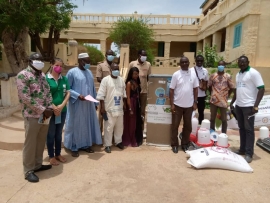In Senegal and Ghana, they are carrying out awareness and information campaigns in rural areas with the aim of spreading good health and hygiene practices and distributing personal protective equipment.
In the Democratic Republic of the Congo, they are working to donate a subsidiary to girls and boys who cannot go to school and do not have the opportunity to take advantage of online education. They distribute masks to the most vulnerable groups of populations, such as pregnant women, the elderly and the disabled. Furthermore, they take care of street children who are even more exposed to the risks of violence, poverty and contagion during the pandemic.
In Bolivia, VIS monitors families in a situation of vulnerability and with whom they had already been working for some months to reintegrate their children welcomed in a center for minors. These nuclei found themselves in a situation of food poverty. The VIS is reorienting the family reunification project into a humanitarian aid action with the distribution of food parcels.
In Haiti, education and vocational training projects continue, activating a few online courses and trying to follow the children even at a distance. In addition, the operators distribute some hand washing devices that allow sanitation without contact with water taps.
In Palestine, they are supporting the activities of two hospitals by supplying face masks and hand gels.
The VIS officials say: “The people we are helping were already in difficult situations even before the coronavirus arrived. In this complex period for all of us, they have been hit even harder.” And that is why the VIS does not stop and continues to help.


